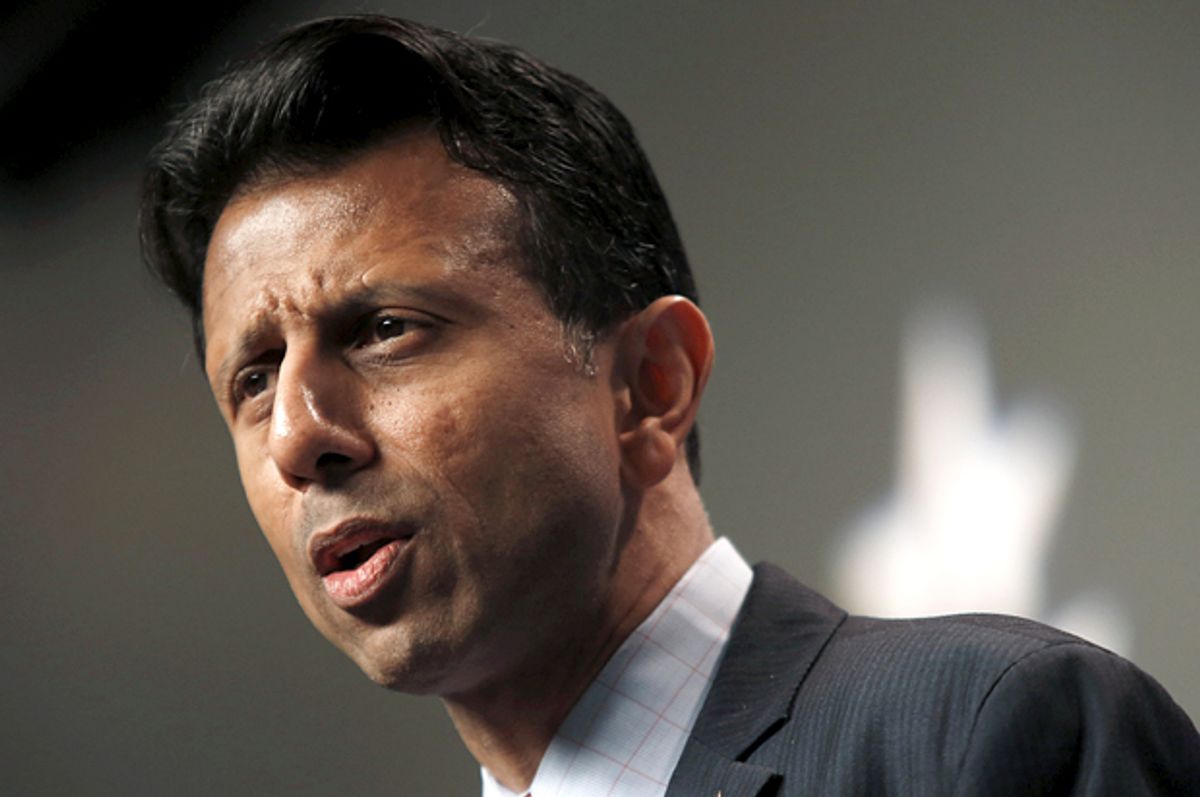A few years ago, the members of the Republican National Committee gathered for a retreat after the 2012 election, in which the Democrats held onto the White House and gained seats in both chambers of Congress. At that meeting in the winter of 2012, Bobby Jindal offered up some fiery words about what his party needed to do to win, including a rejection of its obsession with “identity politics,” which he deemed “corrosive to the great American melting pot."
"We must reject the notion that demography is destiny, the pathetic and simplistic notion that skin pigmentation dictates voter behavior," Jindal said to applause.
To milder applause that night, Jindal called on Republicans to “stop being the stupid party" and to "stop insulting the intelligence of voters.” And yet, just a few years hence we find Piyush “Bobby” Jindal, a Rhodes scholar who once led his state’s university system, engaging in the most regressive of politics as he begins his bid for the presidency.
Just days after the U.S. Supreme Court rejected bans on gay marriage, Jindal’s spokesman Mike Reed said, “We believe the U.S. Constitution, Louisiana Constitution, Louisiana’s Preservation of Religious Freedom Act, as well as our Executive Order prevents government from compelling individuals to violate sincerely held religious beliefs. We will continue to fight to protect religious liberty.” In practice, this means that the governor’s administration issued an executive order to protect clerks and state employees who have moral objections to gay marriage and don’t feel comfortable handing out licenses to same-sex couples.
As Jindal runs for president in the Republican primary, he is resorting to those very same regressive and divisive tactics that only a few short years ago he inveighed against -- so much so, in fact, that many observers were taken in by a satirical article that quoted Jindal as saying, “the Confederate Flag is part of my heritage.” (In fact, the governor has skirted the issue of the flag altogether, telling reporters that “now’s the time for mourning.”) Given Jindal's penchant for refusing to identify as an Indian American, saying that he’s “just American,” while hanging a portrait of himself in his office looking remarkably white, and raging against the need for hyphenated identities, it wasn’t a stretch to imagine Gov. Jindal actually claiming the Confederate flag.
(And that's before we even consider his new campaign slogan -- "Tanned. Rested. Ready." -- which has been met with hostility in recent days by many in the Indian American community.)
In an Op-Ed in February, Gov. Jindal called for “The End of Race,” going “all-in” on the melting pot idea of America and beseeching us all to give up on our racial identities for the sake of a singular American one. This is a very convenient solution for a party that refuses to address racial inequity and injustice, which are, in fact, bedrock values in America. We haven’t ended up with a racialized system where black and brown residents and citizens of the U.S. suffer greater levels of violence, discrimination and institutionalized inequity simply by chance. Our country was founded on, and is grounded in, the belief of a racialized American exceptionalism. It’s a deeply rooted racism that allowed the founders to displace and murder so many of the Native and First Nations people here before them, and to uphold and entrench a system of chattel slavery while talking about American freedom and independence. Today, Jindal’s statements about colorblindness are a disavowal of that legacy and its ongoing aftermath. We are a country in which your race, and gender, are key determinants in whether you’re paid fairly, whether you are likely to be unjustly incarcerated, whether you are likely to be killed by police officers, whether your children will get a good education, whether you will get care when you get sick, whether your babies will be born healthy, and how long you will live.
We do not live in a “colorblind” country, no matter how much Gov. Jindal wishes it were so, nor how much many of us would like to. We live in a hyper-racialized one. Calling for “colorblindness” is a ridiculous solution to a centuries-old racial hierarchy that has devastating results for communities of color. Colorblindness is anti-blackness. Colorblindness is racism. The solutions we need involve looking that truth in the eye and changing racist systems and structures, not turning away and deriding the question itself.

Shares